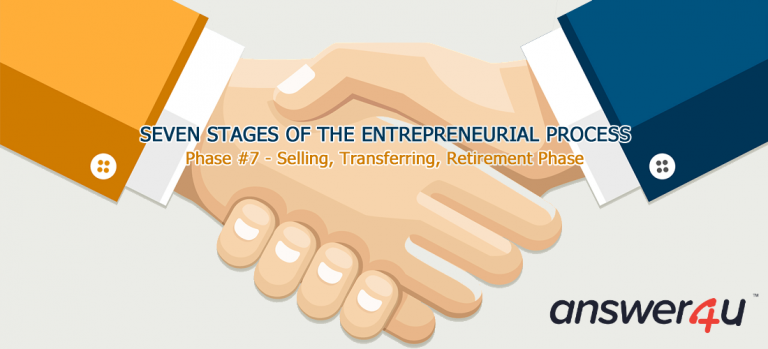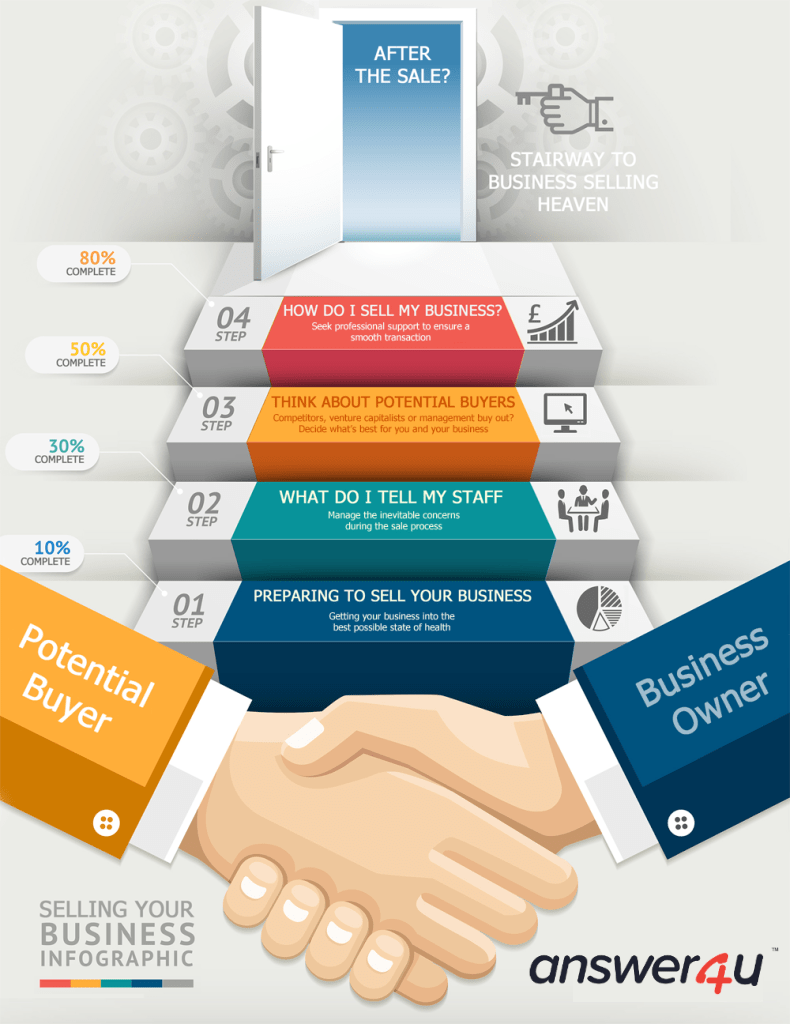
When it comes to the final phase of the entrepreneurial process – selling, transferring or retirement – it may sound like a swift ‘thank you and goodbye’, but in fact there’s a lot more work to do before you can jet off for sunshine and sangria.
Phases one to six of the entrepreneurial process will most likely have stretched both your personal and financial resources at some point, so phase seven may feel like a time to wind down. It’s not.

In fact, successfully implementing this phase will take almost as much planning and detailed preparation as launching your business did in the first place, and to get the best deal you’ll probably need to set the wheels in motion at least a couple of years before you actually plan to leave.
Whichever exit strategy you choose, your business needs to be as attractive as possible to a potential buyer and any sale will hinge on the wider market conditions, your business’s trading success, its finances, its position within the market and its future potential.
Step 1 - Preparing To Sell Your Business
Your preparations for leaving should centre on getting your business into the best possible state of health. This includes maximising your profits and minimising the debt the company carries. Your books will be a crucial part of your evidence base when it comes to a sale, and you’ll also need a current business plan and company portfolio outlining who you are, what you do, the industry and market you operate in, and your financial forecasts.
Potential buyers will want to see that your business is on an even keel and it must be clear that it will thrive with or without you.
This means you need to ensure that there is no turmoil within the company – that employment contracts are up to date and staff turnover is as low as possible, that you have good relationships with your suppliers, and that your customer base is both secure and wide enough to survive the loss of any individual clients.
You also need to check that all your licences, patents and so on are in place and up to date, and are transferable to a new owner.
Step 2 - What Do I Tell My Staff?
Any news of a sale or transfer will be unnerving for staff and you need to have plans in place for how to manage their concerns during the sale process.
While it’s important to keep staff up to date – gossip thrives in an information vacuum – it also makes sense to have a good picture of what is happening yourself before you make an announcement to your teams.
You could consider taking on the services of an external HR specialist in handling this aspect of the process. Remember that teams who are worried about the future may find the work environment difficult, so the more you support them, the better your company will weather the times of uncertainty.
The UK government has published advice related to tax and the rules around employees’ rights when selling and transferring your business. Employees’ rights are particularly important as far as legislation goes, but hopefully by this stage you will have put together a loyal team of staff, and will want to see them get the best outcome from any sale or transfer too.
Step 3 - Think About Your Potential Buyers
Take some time to think about who might want to buy your business and what sort of buyer you would like. You may identify a potential buyer from within the industry who would see extra value in adding your services to their portfolio.
There also might be competitors who would want to buy your business and then asset strip and close it down. Be clear before you begin the process of selling if there is any kind of deal you wouldn’t accept, to save everyone time and prevent any ill will developing.
You may also consider selling all or part of your business to investors such as venture capitalists, or even offer your management or all your staff the option of buying you out and taking the helm themselves.
Whichever way you’d like to go, it’s sensible to take early professional advice on selling your business. You’ll need to brief the professionals supporting the process, so consider first what you as an individual want to get out of the deal and what you would be willing to offer.
Think about whether your exit strategy is flexible – if you were planning to retire but there was an option for you to remain and run the company for the new owners, would you consider that? Or if you were hoping to sell part or all of your business and then stay on, would you walk away if asked? Are you fixed on the proportion of the business that is available for sale, or is that negotiable?
While some flexibility will no doubt be needed during negotiations, having your position in mind when you embark on the process is important.
Step 4 - How Do I Sell My Business?
You can either sell your business directly – you may even have been approached by a buyer – or you can use a broker. Either way, make sure you have all the professional support you need to ensure everything goes as smoothly as possible and you get the best deal for you. For example, you may want a specialist lawyer, and to ask a specialist appraiser to value your business.
Don’t try to go it alone in this final phase, or you risk not getting the return you deserve.
Be flexible and realistic in how you value your company and what you will accept, remembering to take into account any personal tax implications.
As well as ensuring your own business is in great health, do your own due diligence and check on potential buyers. Are they in a position to get the financing to match their offer under the terms agreed?
And don’t expect things to happen overnight. A transfer of either all or part of a business is a major undertaking and both seller and buyer need to take the time and care to ensure the details of the transaction are right for them.
After The Sale
It may feel like the money from your business sale is burning a hole in your back pocket, but make sure everything you do now is carefully planned.
If you’re already moving on to your next enterprise, remember to work through all the same detail as you did when setting up the first time, because one success doesn’t guarantee another. And if you decide to retire, make sure you’ve had some professional, independent financial advice on how to invest your money.
Now celebrate all that you’ve achieved and reap the rewards of your hard work.
Categories
- 24 Hour Call Answering Service (5)
- After Hours Call Answering (5)
- After-Hours Call Answering Service (6)
- Answer-4u (11)
- Artificial Intelligence (1)
- Business (67)
- Business Grants (3)
- Business Growth (4)
- Business Owner (6)
- Business Strategy (2)
- Call Diversion (1)
- Call Handling Service (12)
- Charity (2)
- Christmas (5)
- Customer Experience (4)
- Customer Satisfaction (3)
- Customer Service (18)
- Customer Services (8)
- Decision Making (2)
- Diary Management (3)
- Digital Marketing (16)
- Disaster Recovery (5)
- EntrepPhase (7)
- Entrepreneurs (7)
- Finance (2)
- Funding (3)
- HR (5)
- Inspiration (2)
- Leadership (4)
- Marketing (15)
- Marketing Strategy (2)
- Networking (2)
- Other (4)
- Outsourcing (5)
- Phone Etiquette (5)
- Productivity (6)
- Property Management (3)
- Recruitment (7)
- Self Improvement (2)
- Small Business (12)
- SME (4)
- Staff Training (2)
- Start-Up (9)
- Technology (2)
- Telephone Answering (16)
- Time Management (4)
- Virtual Assistant (3)
- Virtual Receptionist (12)
- Workforce (9)
- Working Environment (9)
- Workplace (28)






